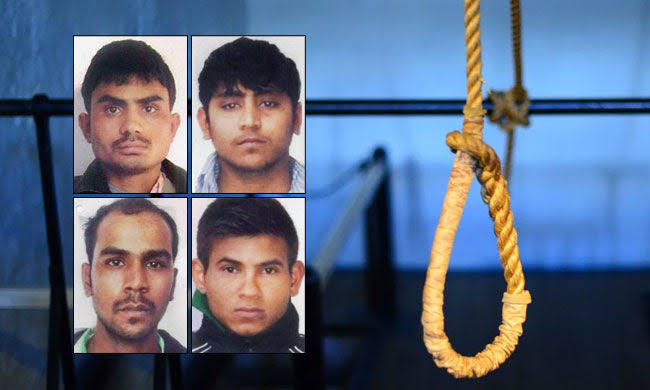NEW DELHI: A Delhi court Wednesday offered a counsel to Pawan Gupta, one of the four death row convicts in the Nirbhaya gang rape and murder case, saying a condemned convict is entitled to legal aide till his last breath.
Additional Session Judge Dharmender Rana expressed displeasure over delay from Pawan’s side who said he has removed his earlier lawyer and will need time to engage a new one.
District Legal Services Authority (DLSA) provided Pawan’s father with a list of its empanelled advocates to chose from.
Pawan has not yet filed a curative petition — the last and final legal remedy available to a person which is decided in-chamber. He also has the option of filing a mercy plea.
Nirbhaya’s parents and the Delhi government had moved the court on Tuesday seeking fresh death warrants for the four convicts after the Supreme Court granted liberty to the authorities to approach the trial court for issuance of fresh date for the execution of these convicts.
The date of execution, first fixed for January 22 in Tihar jail, was postponed for 6 am on February 1 by a January 17 court order. The trial court later, on January 31 stayed, “till further orders” the execution of the four convicts in the case, who are lodged in Tihar Jail.
The Tihar jail authorities had filed a status report on Tuesday before the trial court stating that no legal option was preferred by any convicts — Mukesh Kumar Singh (32), Pawan Gupta (25), Vinay Kumar Sharma (26) and Akshay Kumar (31) — in last seven-day period, granted by the Delhi High Court.
The trial court had on February 7 dismissed the pleas of Delhi government and the Tihar jail authorities seeking fresh date for execution of the four death row convicts in the case.
They had taken note of the high court’s February 5 order permitting the convicts to exercise their legal remedies within one week.
“It is criminally sinful to execute the convicts when law permits them to live. The High Court on February 5 has permitted the convicts, in the interest of justice, to exercise their legal remedies within one week from same order,” the court had said.
“I concur with counsel for convicts that death warrants cannot be executed merely on basis of surmises and conjectures. The application is bereft of merit. Same is dismissed. State is at liberty to move appropriate application as and when required,” the judge had said.
In its order, the high court was critical of the delay caused by the authorities in seeking issuance of death warrants for the convicts as also of the “delay tactics” adopted by the convicts.
“All the authorities concerned were sleeping” and waited till December 2019 “for reasons best known to them” to seek issuance of death warrants, the high court said.
The Delhi government moved the trial court for issuance of black warrants two years after the Supreme Court in 2017 had dismissed the review petition against the confirmation of death penalty.
The authorities had also informed the court about the Delhi High Court’s February 5 order which directed the convicts to take steps within a week, if they wished, to avail any remedy available under the law.
The warrants, issued by the trial court on January 7, were later postponed “sine die” by it on January 31, giving the condemned prisoners a reprieve for the second time in two weeks.
The date of execution, first fixed for January 22 in Tihar jail, was later postponed for 6 am on February 1 by a January 17 court order.
The 23-year-old physiotherapy intern, who came to be known as ‘Nirbhaya’ (fearless), was gang-raped and savagely assaulted on the night of December 16, 2012, in a moving bus in South Delhi. She died of her injuries a fortnight later in a Singapore hospital.
Six people including the four convicts, Ram Singh and a juvenile — were named as accused.
The trial of the five adult men began in a special fast-track court in March 2013.
Ram Singh, the prime accused, allegedly committed suicide by hanging himself in Tihar jail days after the trial began. The juvenile, who was said to be the most brutal of the attackers, was put in a correctional home for three years.
The juvenile was released in 2015 and sent to an undisclosed location amid concerns over a threat to his life. He, when released, was 20 years old.
Mukesh, Vinay, Akshay and Pawan were sentenced to death in September 2013 by the trial court. (AGENCIES)


